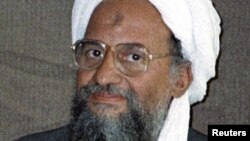DUBAI —
Al-Qaida leader Ayman al-Zawahri has intervened in a dispute between the Iraqi and Syrian branches of his network, telling both to "stop arguing." Qatar-based Al Jazeera television reported.
Al-Qaida in Iraq announced in April that it had united with Syria's Nusra Front, which now spearheads the fight against President Bashar al-Assad. This upset Nusra, which affirmed its loyalty to Zawahri but said it had not been told of any merger.
Nusra leaders, aware that many Syrians had joined the Front because of its military prowess, rather than for ideological reasons, had previously sought to minimize the use of tactics such as indiscriminate attacks on civilians and Islamist crackdowns which had alienated many Iraqis from al-Qaida in Iraq during the struggle against the U.S.-led occupation after 2003.
According to a letter purportedly from Zawahri and posted on Al Jazeera's website, the al-Qaida leader annulled the merger declared by the leader of the Islamic State in Iraq, Abu Bakr al-Baghdadi, saying each group was separate.
"The Islamic State of Iraq and the Levant is cancelled, and work continues under the name the Islamic State of Iraq," he said in the letter posted on the website on Sunday night.
"The Nusra Front for the People of the Levant is an independent branch" of al-Qaida, Zawahri said, urging both groups to "stop arguing in this dispute, and to stop the harassment among the Muslims."
He also said Baghdadi and Nusra Front leader Abu Mohammad al-Golani would continue to head their groups for a year, pending a decision by their respective consultative assemblies.
The letter's authenticity could not immediately be verified.
The Nusra Front burst into prominence early last year, when it claimed responsibility for several powerful bombings in the Syrian capital Damascus and the northern city of Aleppo.
Since then it has expanded operations nationwide, winning recruits among rebels who see it as the most effective fighting force against Assad's troops, and it has taken a leading role in capturing territory in the north, south and east of Syria.
Al-Qaida in Iraq, which suffered setbacks before U.S. troops left at the end of 2011, has bounced back with suicide bombings and coordinated attacks this year, including an ambush which killed 48 Syrian soldiers who had fled across the border.
Iraqi security officials have said since last year that the militants were again active in Iraq's western desert region next to Syria, where cross-border Sunni tribal ties are strong.
Al-Qaida's Iraqi wing and Syria's Islamist insurgents share a hatred for Assad's Alawite-based power and for Iraqi Prime Minister Nuri al-Maliki's Shi'ite-led government, which they see as oppressors of Sunnis in both countries.
Al-Qaida in Iraq announced in April that it had united with Syria's Nusra Front, which now spearheads the fight against President Bashar al-Assad. This upset Nusra, which affirmed its loyalty to Zawahri but said it had not been told of any merger.
Nusra leaders, aware that many Syrians had joined the Front because of its military prowess, rather than for ideological reasons, had previously sought to minimize the use of tactics such as indiscriminate attacks on civilians and Islamist crackdowns which had alienated many Iraqis from al-Qaida in Iraq during the struggle against the U.S.-led occupation after 2003.
According to a letter purportedly from Zawahri and posted on Al Jazeera's website, the al-Qaida leader annulled the merger declared by the leader of the Islamic State in Iraq, Abu Bakr al-Baghdadi, saying each group was separate.
"The Islamic State of Iraq and the Levant is cancelled, and work continues under the name the Islamic State of Iraq," he said in the letter posted on the website on Sunday night.
"The Nusra Front for the People of the Levant is an independent branch" of al-Qaida, Zawahri said, urging both groups to "stop arguing in this dispute, and to stop the harassment among the Muslims."
He also said Baghdadi and Nusra Front leader Abu Mohammad al-Golani would continue to head their groups for a year, pending a decision by their respective consultative assemblies.
The letter's authenticity could not immediately be verified.
The Nusra Front burst into prominence early last year, when it claimed responsibility for several powerful bombings in the Syrian capital Damascus and the northern city of Aleppo.
Since then it has expanded operations nationwide, winning recruits among rebels who see it as the most effective fighting force against Assad's troops, and it has taken a leading role in capturing territory in the north, south and east of Syria.
Al-Qaida in Iraq, which suffered setbacks before U.S. troops left at the end of 2011, has bounced back with suicide bombings and coordinated attacks this year, including an ambush which killed 48 Syrian soldiers who had fled across the border.
Iraqi security officials have said since last year that the militants were again active in Iraq's western desert region next to Syria, where cross-border Sunni tribal ties are strong.
Al-Qaida's Iraqi wing and Syria's Islamist insurgents share a hatred for Assad's Alawite-based power and for Iraqi Prime Minister Nuri al-Maliki's Shi'ite-led government, which they see as oppressors of Sunnis in both countries.











